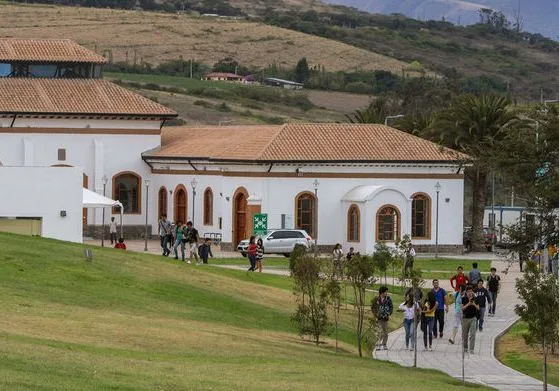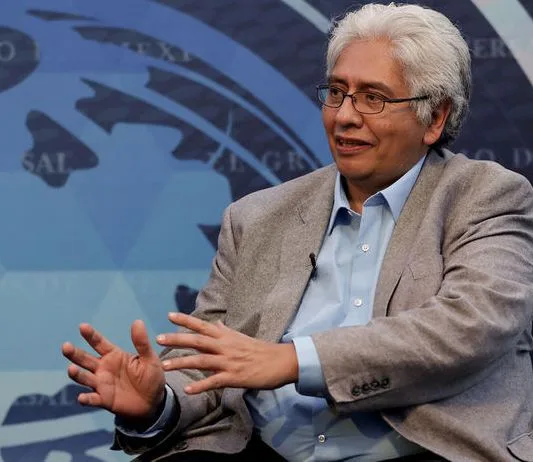Ecuador’s ‘Silicon Valley of Latin America’ faces reality check from economic and political pressures
By Emiliano Rodríguez Mega
Paola Ayala knew it was a gamble to dial down her physics research at the University of Vienna in May 2015 and spend most of her time at Yachay Tech University, a nascent institution in rural northern Ecuador backed with an estimated $1 billion in government funding. But the allure of the grand experiment to create a world-class research university in the Andes was overpowering. Ayala, the first Ecuadorian woman to get a Ph.D. in physics, was eager to return home as the school’s new dean of physical sciences and nanotechnology. “I wanted to help change my country,” she says.

The Yachay Tech campus in Urcuquí.
Ayala’s run in Ecuador didn’t last long. Last month, Yachay Tech fired her and five other scientists in leadership positions, including Chancellor Catherine Rigsby, a geologist recruited from East Carolina University in Greenville, North Carolina. Ecuador’s struggling economy may have played some role; the university in a June 22 statement said that the terminations were part of an austerity plan meant to trim $2 million in expenses. But the ousted academics say they are victims of shifting national priorities and a personality conflict with Yachay Tech’s new rector, the university’s top position.
The acrimonious dispute comes at what everybody involved agrees is a moment of truth for Yachay Tech. Ecuador’s former president, Rafael Correa, launched the institution in 2013 as part of a bid to transform the nation’s economy from one reliant on exports of oil and other commodities to one that generates its own innovations. The government began erecting a sprawling campus in Yachay, coined the “City of Knowledge,” three hours north of Quito, Ecuador’s capital, in Urcuquí, and the nascent venture wooed overseas faculty with competitive salaries.
At its launch, Correa boldly predicted that Yachay Tech and the City of Knowledge, would become Latin America’s Silicon Valley.
Since then, oil prices have plummeted and Ecuador’s new government, which came to power in May, does not appear to share Correa’s vision for Yachay, which means “knowledge” in kichwa, the local language. Tensions rose in recent months as Yachay Tech’s rector, Carlos Castillo-Chavez, derided the university’s overall research output. Faculty members pushed back, charging that administrators and Yachay EP, the public company that runs the university and surrounding science city, failed to live up to promises of support for their work. Laboratories are still works in progress, and scientists say they lack equipment and materials. Ayala and others accuse Castillo-Chavez of steering the institution away from its original concept of a research powerhouse and toward a more typical university that emphasizes teaching.

Yachay Tech Rector Carlos Castillo-Chavez
Castillo-Chavez, a prominent Mexico-born mathematical biologist who retains a position at Arizona State University in Tempe, expressed his disillusionment with Yachay Tech days after arriving on the campus last May. Despite “tremendous working conditions for the faculty,” he wrote in a June 4 email to Ayala and other senior scientists that Science obtained, he had found “limited productivity and almost zero efforts to bring [in] extramural funding.” Most of Yachay Tech’s professors are overpaid and would “not be hired at most research universities in the USA,” he asserted. “This is not the environment that I expected.”
Yachay Tech, he further wrote, must “embrace the national educational policies, which demand access, more students, reduced costs, and institutional collaboration.” In its statement on the firings, the university also noted plans to vastly boost enrollment, aiming to increase the student body fivefold, to 5,000, over the next four years.
“We went from feeling like we were at the top of the world to complete despair,” says Paul Baker, who was Yachay Tech’s dean of geological sciences until he was fired last month. (He has since returned to his previous institution, Duke University in Durham, North Carolina.) In a June 20 email to Castillo-Chavez, Ayala stated that she was “ready to tighten the budget.” And she challenged the rector to “be that person we were waiting for [for] months. The leader who can take care of the politics.”
But evidently the die had already been cast. On June 20, Yachay Tech dismissed Ayala, Baker, and four colleagues. In later media reports, Castillo-Chavez criticized the dismissed researchers for not teaching (Baker and others say they were never asked to teach) and for excessive travel. (They say Castillo-Chavez had approved their travel.) After Baker questioned the qualifications of his successor as dean, Castillo-Chavez emailed Duke Provost Sally Kornbluth what Baker saw as a threat to his visa. “We are in the process of reporting his behavior to the appropriate immigration authorities of Ecuador,” the rector wrote.
Castillo-Chavez did not respond to emails from Science, and a Yachay Tech spokesperson stated that the rector would not comment further. In a 27 June report in Ecuador’s El Telégrafo newspaper, Castillo-Chavez stated that to save money, junior professors at Yachay Tech would serve as temporary deans for one to three years. The austerity plan, he told El Telégrafo, would not include a reduction of his own Yachay Tech income — $18,126 per month, or triple former President Correa’s government salary in 2015 — because his “family needs” required his full salary. He is also continuing to work half time as a regents professor at Arizona State and co-directing the Simon A. Levin Mathematical, Computational and Modeling Sciences Center, for which he is drawing a salary of $122,069 a year.
The turmoil at Yachay Tech has not subsided. On July 13, the department of human resources sent an email to employees spelling out how to tender their resignations if they wish to quit. “For me, all hope is lost. Academic freedom no longer exists at Yachay Tech,” one professor who asked to remain anonymous told Science. “Like many others, I am finding my fastest way to move on and leave this broken institution behind me.”
If Yachay Tech unravels, some fear that science in Ecuador will suffer a severe setback. “The way that we were treated was abhorrent, but all that is eclipsed by the missed opportunities of a whole country,” says Vladimiro Mujica, former dean of chemical sciences and engineering who was also fired last month and has relocated to Arizona State. “As an Ecuadorian myself, it makes me feel terrible,” says Ayala, who has returned to Vienna. “We will have to wait at least 100 years until someone else risks investing in a similar project, once people have forgotten about all of this mess,” she says.
_________________
Emiliano Rodríguez Mega is a science journalist based in Mexico City.




















